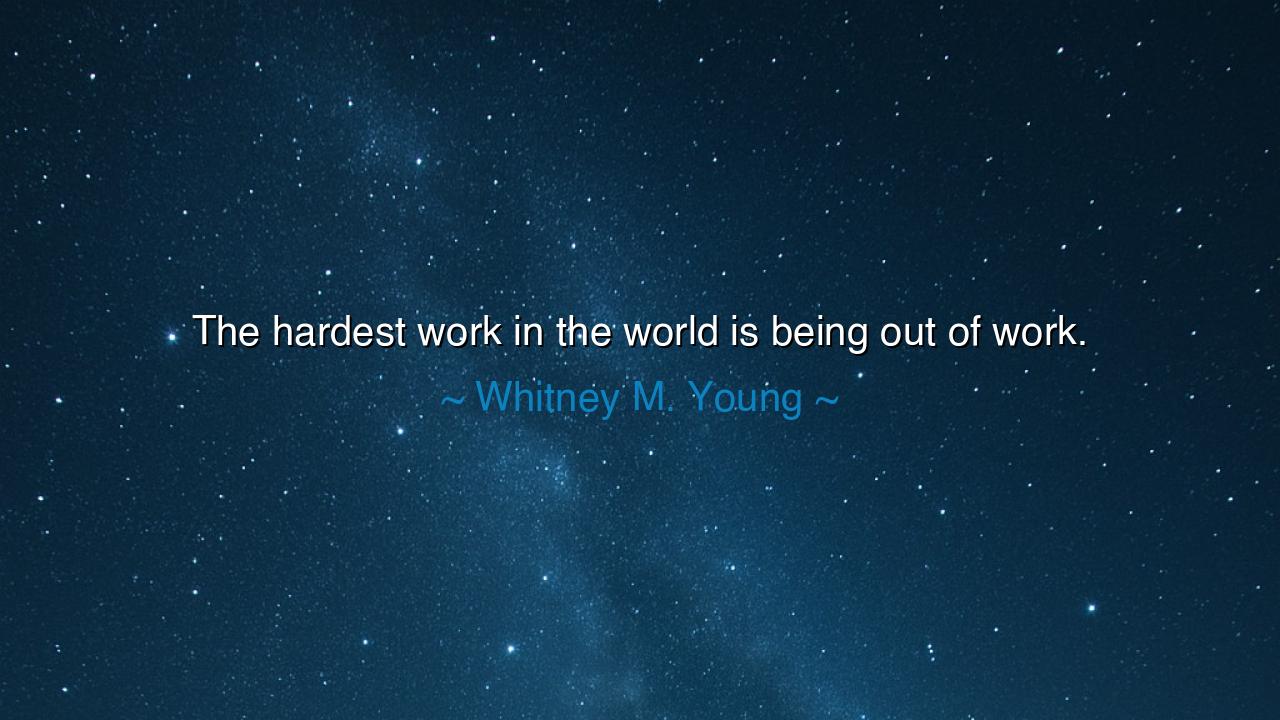
The hardest work in the world is being out of work.






The wise and compassionate leader Whitney M. Young once declared: “The hardest work in the world is being out of work.” In these few words, he reveals a truth that strikes deep into the human soul. Labor is not only a means of survival but also a source of dignity and purpose. To be deprived of work is to be burdened with an invisible weight, one that crushes the spirit even more than the body’s toil.
When a person is out of work, they are not free, as some might imagine, but instead trapped in a struggle against despair. Each passing day brings feelings of inadequacy and fear, as the mind wrestles with questions of worth and survival. It is a labor of the heart and mind, far heavier than the physical strains of any task. The hands may be still, but the soul toils in silence, carrying the anguish of uncertainty and longing.
Young’s words also speak of society’s role in this silent suffering. For a community thrives when its people are engaged in meaningful work, but when many are left without it, despair spreads like a shadow, weakening the bonds between individuals and nations. The struggle of the unemployed is not theirs alone; it ripples outward, affecting families, communities, and the future of generations yet to come.
The origin of this teaching lies in Whitney M. Young’s life as a civil rights leader and advocate for economic justice. He fought tirelessly to create opportunities for those who were marginalized and forgotten, knowing that true equality is not only found in freedom of speech or law but also in the chance to labor with dignity. His words come from witnessing the suffering of those denied this basic human need.
Thus, let this wisdom endure: never underestimate the weight of being out of work. To provide opportunities for labor is to restore hope, dignity, and purpose. And for those who face this struggle, let them know they are engaged in the hardest work of all—the unseen battle to keep faith alive until the doors of opportunity are opened once more.






HTHoai Thi
I find this quote powerful because it speaks to the often unacknowledged struggles of being unemployed. The emotional weight of job searching, dealing with rejection, and managing self-esteem during this time can be overwhelming. How do we offer more empathy and practical help to those in transition, instead of just expecting them to ‘find something’ and get back to ‘work’?
UGUser Google
Whitney M. Young’s perspective on unemployment challenges the common narrative that being out of work is a time for rest or relaxation. It’s actually a period of constant emotional and psychological labor. How do we redefine the concept of ‘work’ to include the mental work of navigating unemployment? Can we offer more resources or support to help people through this stage without feeling judged or lost?
NTChien Nguyen Trong
Young’s quote brings an important perspective on the challenges of unemployment that many people overlook. The mental strain of not having a job can sometimes be more overwhelming than the physical labor of working. How can we better support people who are out of work, especially in a society that often values productivity over mental health? Is there enough focus on these invisible challenges?
NNBao Yen Nguyen Ngoc
I agree with Whitney M. Young that being out of work can be incredibly difficult. It's not just about finding a job; it's about dealing with the social stigma, financial pressures, and self-worth issues that come with it. How do we create a society that better supports people through unemployment, instead of viewing it as a personal failure? Can we make unemployment less of a burden?
HTThom Hoang Thi
This quote really resonates with me because it highlights the unseen struggles of being unemployed. There’s so much energy that goes into maintaining hope and fighting the feeling of being stuck. How do people manage the emotional toll of job hunting without burning out? Is there a way to find balance and mental clarity when facing rejection or uncertainty?